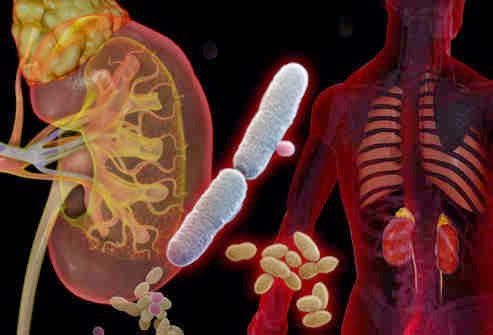What's in this article?
- 1 What Is a Urinary Tract Infection?
- 2 When to See Your Doctor
- 3 UTI or Something Else?
- 4 Honeymoon Cystitis
- 5 Stealth UTI
- 6 UTI Complications
- 7 How Do UTIs Begin?
- 8 Urinary Tract Infections in Men
- 9 Diagnosing UTIs
- 10 Treating UTIs
- 11 UTIs and Diabetes
- 12 UTIs and Pregnancy
- 13 UTIs and Menopause
- 14 UTIs and Hospital Stays
- 15 UTIs in the Elderly
- 16 UTIs in Children
- 17 UTI or Potty Training Problem?
What Is a Urinary Tract Infection?
About half of women will get a urinary tract infection or UTI at some point in life. It happens when germs infect the system that carries urine out of your body the kidneys, bladder, and the tubes that connect them. Bladder infections are common and usually not serious if treated promptly. But if the infection spreads to the kidneys, it can cause more serious illness.
When to See Your Doctor
See your doctor right away if you have signs of a urinary tract infection. A bladder infection is generally not a medical emergency but some people have a higher risk for complications. This includes pregnant women, the elderly, and men, as well as people with diabetes, kidney problems, or a weakened immune system.
UTI or Something Else?
Although burning during urination is a telltale sign of a UTI, it can also be a symptom of certain sexually transmitted diseases (STDs.) These include chlamydia, gonorrhea, and trichomoniasis. Simple lab tests are available to distinguish a UTI from an STD.
Honeymoon Cystitis
Few things can ruin a honeymoon like a UTI. But this is so common, it has its own name “honeymoon cystitis.” The reason is that sexual activity can push bacteria into the urethra. Of course, the problem is not confined to honeymoons. Some women get a bladder infection almost every time they have sex. Women who use a diaphragm for birth control are especially vulnerable.
Stealth UTI
Occasionally, UTIs occur without the classic symptoms. A person may have no symptoms at all. Yet, a urine test shows the presence of bacteria. This is known as asymptomatic bacteriuria. In many cases, no treatment is needed. But pregnant women, some children, and recipients of kidney transplants should be treated to avoid a kidney infection.
UTI Complications
ComplicationsThe main danger associated with untreated UTIs is that the infection may spread from the bladder to one or both kidneys. When bacteria attack the kidneys, they can cause damage that will permanently reduce kidney function. In people who already have kidney problems, this can raise the risk of kidney failure. There’s also a small chance that the infection may enter the bloodstream and spread to other organs.
How Do UTIs Begin?
Many types of bacteria live in the intestines and the genital area, but this is not true of the urinary system. In fact, urine is sterile. So when errant bacteria, such as the E. coli shown here, is accidentally introduced into the urinary system, it can start a UTI. Typically, bacteria travel up the urethra to the bladder, where an infection can take hold. Women are more susceptible than men, probably because they have shorter urethras.
Urinary Tract Infections in Men
Men are much less likely than women to get UTIs. When it does happen, it’s often related to another underlying medical condition, such as a kidney stone or an enlarged prostate.
Diagnosing UTIs
The first step in diagnosing a UTI is usually a simple urine test called a urinalysis. It looks for bacteria, as well as abnormal counts of white and red blood cells. The dipstick test provides quick results. Your doctor may also send your urine to a lab for culture to confirm the type of bacteria. At-home test kits can help detect a UTI, but are not 100% accurate. Be sure to go over the results and your symptoms with your doctor.
Treating UTIs
Prescription antibiotics will almost always cure a UTI. Your health care provider may recommend drinking lots of fluids and emptying your bladder frequently to help flush out the bacteria. Kidney infections can often be treated with oral antibiotics, too. But severe kidney infections may require hospital care, including a course of intravenous antibiotics.
UTIs and Diabetes
People with diabetes are more vulnerable to UTIs for several reasons. First, their immune systems tend to be weaker. Second, high blood sugar can spill into the urine and encourage the growth of bacteria. Also, nerve damage related to diabetes can prevent the bladder from fully emptying. People with diabetes should talk with their doctor at the first sign of a UTI.
UTIs and Pregnancy
During pregnancy, there are several factors that boost the risk of UTIs, especially a kidney infection. Hormones cause changes in the urinary tract, and the uterus may put pressure on the ureters or bladder or both making it more difficult for urine to pass from the kidneys to the bladder and out. Untreated UTIs can contribute to preterm labor, so be sure to alert your doctor if you suspect you have an infection.
UTIs and Menopause
Estrogen has a protective effect in the urinary tract, but levels of this hormone drop off significantly during menopause. Low estrogen levels can make it easier for bacteria to thrive in the vagina or urethra. For this reason, women may be more susceptible to UTIs after menopause.
UTIs and Hospital Stays
A hospital stay can put you at risk for a UTI, particularly if you need to use a catheter. This is a thin tube that’s inserted through the urethra to carry urine out of the body. Bacteria can enter through the catheter and reach the bladder. This is more often a problem for older adults who require prolonged hospital stays or who live in long-term care facilities.
UTIs in the Elderly
UTIs are among the most common infections in the elderly. But the symptoms may not follow the classic pattern. Agitation, delirium, or other behavioral changes may be the only sign of a UTI in elderly men and women. This age group is also more likely to develop serious complications as a result of UTIs.
UTIs in Children
About 1% of boys and 3% of girls develop UTIs by age 11. This includes some children who repeatedly delay a bathroom trip. Their muscles may not relax enough later to fully empty the bladder and flush away any bacteria. More regular bathroom trips and drinking plenty of liquids may help. A small number of children have a structural problem that obstructs urine flow or lets urine flow back from the bladder to the kidneys, triggering chronic kidney infections. This can lead to kidney damage.
UTI or Potty Training Problem?
Accidents are par for the course during toilet training. Even kids who have mastered the art of the potty may sometimes have a relapse. Other children may scream or cry when taken to the potty, as a way of rebelling against the process. These are generally not signs of a UTI.
















